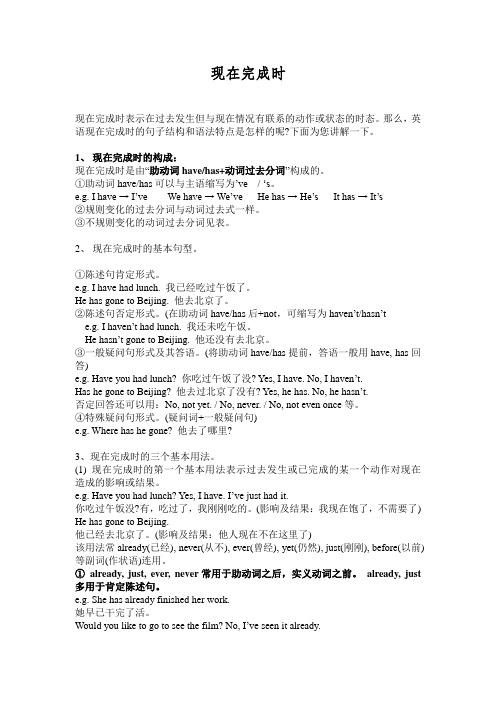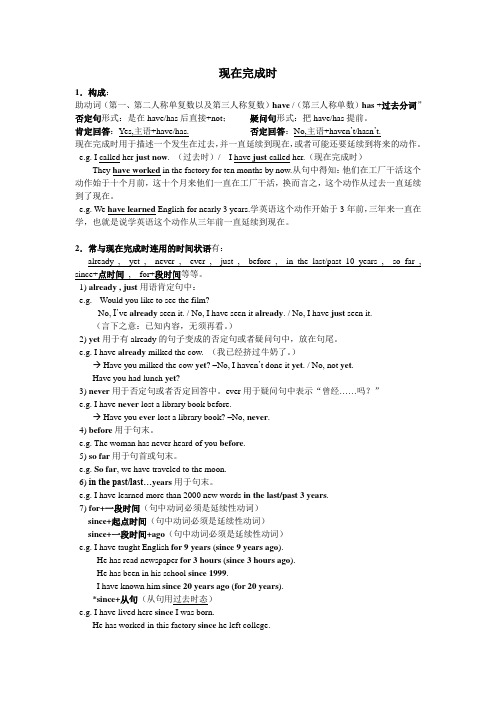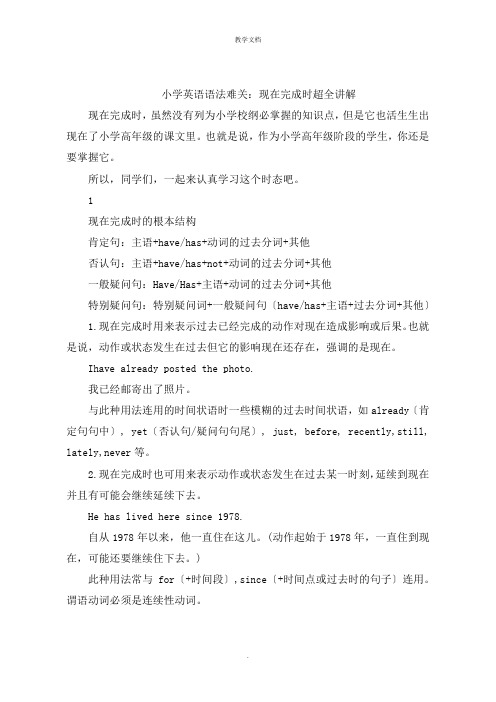现在完成时时态讲解
初中时态讲解《现在完成时》(共28张PPT)

•
—I have _____ to Kunming with my
friends.
• A been , gone
B been , been
• C gone , been
D gone, gone
• ( C )2. How long have you ____ this book?
• A. bought B. borrowed C. had D. lent
Yes,she has.?No,she hasn’t.
4.时间状语:already, yet, ever, never, just, before , for, since, so far, till/until, up to now, in the past/last few years, recently, … 等.
5.现在完成时的概念
1)表示过去发生或已完成的动作对 现在造成的影响或结果;
2) 表示过去已经开始并一直持续 到现在的动作或状态。
• 意义1
• 表示过去发生或已完成的动作对现在造成的影响 或结果
My daughter hasjust gonoeut. 我女儿刚出去。 (go)
I’m sure we have metbefore. 我肯定我们以前见 过面。(meet)
3.They have left only for 5 minutes. 错 They have __b_ee_n_ __a_w_a_y only for 5 minutes.
• 1) They came here last week.
• They ____h_a_v_e__ _b_e_e_n_____ here since ______la_s_t_ w__e_e_k______.
现在完成时态讲解

现在完成时现在完成时表示在过去发生但与现在情况有联系的动作或状态的时态。
那么,英语现在完成时的句子结构和语法特点是怎样的呢?下面为您讲解一下。
1、现在完成时的构成:现在完成时是由“助动词have/has+动词过去分词”构成的。
①助动词have/has可以与主语缩写为‟ve / …s。
e.g. I have → I‟ve We have → We‟ve He has → He‟s It has → It‟s②规则变化的过去分词与动词过去式一样。
③不规则变化的动词过去分词见表。
2、现在完成时的基本句型。
①陈述句肯定形式。
e.g. I have had lunch. 我已经吃过午饭了。
He has gone to Beijing. 他去北京了。
②陈述句否定形式。
(在助动词have/has后+not,可缩写为haven‟t/hasn‟te.g. I haven‟t had lunch. 我还未吃午饭。
He hasn‟t gone to Beijing. 他还没有去北京。
③一般疑问句形式及其答语。
(将助动词have/has提前,答语一般用have, has回答)e.g. Have you had lunch? 你吃过午饭了没? Yes, I have. No, I haven‟t.Has he gone to Beijing? 他去过北京了没有? Yes, he has. No, he hasn‟t.否定回答还可以用:No, not yet. / No, never. / No, not even once等。
④特殊疑问句形式。
(疑问词+一般疑问句)e.g. Where has he gone? 他去了哪里?3、现在完成时的三个基本用法。
(1) 现在完成时的第一个基本用法表示过去发生或已完成的某一个动作对现在造成的影响或结果。
e.g. Have you had lunch? Yes, I have. I‟ve just had it.你吃过午饭没?有,吃过了,我刚刚吃的。
初中现在完成时讲解ppt

• 在以上两种用法中常跟already, not…yet, never, just, before, ever, recently等
时间继续下去的状语。
• 3) 表示过去已经开始, 持续到现在, 也 许还会继续下去的动作或状态,常与包 括现在在内的一段时间的状语连用。
动词填空:
1._H_a__v_eyou _c_l_e_a_n_e_d_(clean) the room? Yes, we_h_a__v_e_d__o_n_e(do) that already. When __d_id____ you __d_o___(do) it? We __d_id____(do) it an hour ago.
2._H__a_s__ he _s_e__e_n_(see) this film yet? Yes. When _d_i_d__ he s_e__e__(see) it? He __s_a_w__ it last week.
3. How many times _h_a_v_e_you_c_o__m__e(come) here?
练习题:
1.It's a long time since we _m_e_t_ (meet) last, isn't i
t?
2.--I know youh_a_v__e__c_h_o_s_e_n(choose) a picture book amon
g these.
--Yes,Have a look at it, please.
现在完成时的否定形式: have not (haven’t) +过去分词 has not (hasn’t) +过去分词
英语现在完成时讲解

分清“现在完成时”与“一般过 去时” Nhomakorabea
Tips:现在完成时属于现在时态的范围,不能和 表示过去时态的时间状语连用,如: yesterday/last night/three weeks ago/In 1999 等等。 Example:1.I have seen the film. 2.I saw the film last week. 1.He has lived here since 1991. 2.He lived here in 1991.
③.表示某动作从过去开始,一直持续到现在,可能还会持续下去。通常与for或 since连用。 如: IhavelivedinQingdaofor6years./since6yearsago/since2003/sinceIcametothiscity. It Is/has been…+since…. It’s been seven years since we last saw each other. It’s six years since he was a teacher. 注意:for+一段时间,since后接一个过去的时间点或一般过去时的句子。
①肯定句:主语+have/has+过去分词 ②否定句:主语+have/has+not+过去分词 ③疑问句:Have/Has+主语+过去分词
(2)现在完成时的用法
①表示到目前为止曾经有过的或未曾有过的经历和体验。常和never, ever, several times等连用。 如: I’ve never been to Africa. Have you ever been to Tokyo? I’ve been there three times. ②.表示某动作从过去开始,现在刚刚完成,对现在有一定的影响。常与just, already,yet,so far /in the past two year 等词语连用。 如: He has just finished his new book. 注意:just now用于过去时。
英语现在完成时讲解

现在完成时1.构成:助动词(第一、第二人称单复数以及第三人称复数)have /(第三人称单数)has +过去分词”否定句形式:是在have/has后直接+not;疑问句形式:把have/has提前。
肯定回答:Y es,主语+have/has. 否定回答:No,主语+haven’t/hasn’t.现在完成时用于描述一个发生在过去,并一直延续到现在,或者可能还要延续到将来的动作。
e.g. I called her just now. (过去时)/ I have just called her.(现在完成时)They have worked in the factory for ten months by now.从句中得知:他们在工厂干活这个动作始于十个月前,这十个月来他们一直在工厂干活,换而言之,这个动作从过去一直延续到了现在。
e.g. We have learned English for nearly 3 years.学英语这个动作开始于3年前,三年来一直在学,也就是说学英语这个动作从三年前一直延续到现在。
2.常与现在完成时连用的时间状语有:already , yet , never , ever , just , before , in the last/past 10 years , so far , since+点时间, for+段时间等等。
1) already , just用语肯定句中:e.g. --Would you like to see the film?--No, I’ve already seen it. / No, I have seen it already. / No, I have just seen it.(言下之意:已知内容,无须再看。
)2) yet用于有already的句子变成的否定句或者疑问句中,放在句尾。
e.g. I have already milked the cow. (我已经挤过牛奶了。
现在完成时讲解

现在完成时讲解LEKIBM standardization office【IBM5AB- LEKIBMK08- LEKIBM2C】现在完成时讲解一.基本结构:助动词have/has+过去分词(done)二.句型:否定句:主语+have/has+not+过去分词+其他. 一般疑问句:Have/Has+主语+过去分词+其他. 简略答语: Yes, 主语 + have/has.(肯定) No, 主语 + haven't/hasn't.(否定)三.用法(1)现在完成时表示过去发生或已经完成的动作对现在造成的影响或结果I have spent all of my money (so far).(含义是:现在我没有钱花了.)Guo zijun has (just/already) come. (含义:郭子君现在在这儿)My father has gone to work.(含义是:我爸爸现在不在这儿)(2)现在完成时可以用来表示发生在过去某一时刻的,持续到现在的动作(用行为动词表示)或状态(be动词表示)常与for(+时间段),since(+时间点或过去时的句子)连用.①for+时段②since+过去一个时间点(译为:自从……以来)③since+时段+ago④since+从句(过去时)⑤It is+时段+since+从句(过去时)Mary has been ill for three days.I have lived here since 1998.四.has gone (to),has been (to), has been (in) 的区别Have/Has gone(to) :去了(现在不在说话现场)Where is your father?He has gone to Shanghai.Have/Has been (to) :去过(已不在去过的地方)My father has been to Shanghai.Have/has been in:呆了多久(还在所呆的地方)My father has been in Shanghai for two months. /since two months ago.五.现在完成时的标志1.现在完成时的含义之一是过去完成的动作对现在仍有影响,用以下四大标志词可以表达这种含义:* 以already, just和yet为标志He has already got her help.他已得到她的帮助。
时态详解:现在完成时

时态详解:现在完成时一、如何理解现在完成时现在完成时是英语中一个很重要的时态,也是很容易弄错的一个时态。
首先,我们来看看“现在完成时”该如何理解。
你可能会根据字面意思将其理解为:现在完成时就是表示现在已经完成的动作。
但是,这样的理解是很不全面的理解,甚至是很危险的!因为这样的理解将来误导你混淆现在完成时与一般过去的区别。
现在完成时有两个主要用法:一是已完成用法,也叫影响性用法。
该用法的现在完成时表示一个过去发生的动作在过去已经完成,并且这个过去发生并完成的动作对现在有影响或结果,同时说话强调的或感兴趣的就是这个影响或结果,如汉语说“他已离开这个城市了”,其中的“离开”肯定发生了,它对现在的影响或结果就是“他现在已不在这个城市了”;又如汉语说“有人把窗户打破了”,显然“打破窗户”这一动作发生在过去,并且在过去已经完成了,但说话人强调的重点是打破窗户对现在的影响——窗户现在仍是破的。
现在完成时的另一个用法叫未完成用法,也叫持续性用法。
该用法的现在完成时表示一个过去发生的动作或开始的状语在过去并未完成或结束,而是一直持续到现在,并且有可能继续下去(也可能到此结束),如汉语说“他在我们教书已有30年了”,显然“他在我们学校教书”是从30年前开始,并且一直教到现在,已经持续了30年;又如汉语说“自上个星期以来他一直很忙”,显然“忙”是从上个星期开始的,并且这一“忙”就一直忙到现在。
二、现在完成时构成与用法现在完成时由“have / has +过去分词”构成。
如:He has seen the film several times. 这部电影他已看了好几次。
I have known her for a long time. 我认识她很长时间了。
句中的has seen 和have known 均为现在完成时,第一句属影响性用法,其影响是“他对电影内容非常熟悉了”;第二句属持续性用法,指“认识她”已持续了很长一段时间。
小学英语语法难关:现在完成时超全讲解

小学英语语法难关:现在完成时超全讲解现在完成时,虽然没有列为小学校纲必掌握的知识点,但是它也活生生出现在了小学高年级的课文里。
也就是说,作为小学高年级阶段的学生,你还是要掌握它。
所以,同学们,一起来认真学习这个时态吧。
1现在完成时的根本结构肯定句:主语+have/has+动词的过去分词+其他否认句:主语+have/has+not+动词的过去分词+其他一般疑问句:Have/Has+主语+动词的过去分词+其他特别疑问句:特别疑问词+一般疑问句〔have/has+主语+过去分词+其他〕1.现在完成时用来表示过去已经完成的动作对现在造成影响或后果。
也就是说,动作或状态发生在过去但它的影响现在还存在,强调的是现在。
Ihave already posted the photo.我已经邮寄出了照片。
与此种用法连用的时间状语时一些模糊的过去时间状语,如already〔肯定句句中〕, yet〔否认句/疑问句句尾〕, just, before, recently,still, lately,never等。
2.现在完成时也可用来表示动作或状态发生在过去某一时刻,延续到现在并且有可能会继续延续下去。
He has lived here since 1978.自从1978年以来,他一直住在这儿。
(动作起始于1978年,一直住到现在,可能还要继续住下去。
)此种用法常与for〔+时间段〕,since〔+时间点或过去时的句子〕连用。
谓语动词必须是连续性动词。
有些瞬间动词可变为连续动词:go out----be outfinish----be overopen----be opendie----be deadbuy---havefall ill---be illcome back----be backcatch a cold----have a cold2现在完成时的常见用法对于现在完成时的考查,多以单项选择、句型转换或词语运用的形式考查学生在具体语境中灵敏运用时态的能力。
- 1、下载文档前请自行甄别文档内容的完整性,平台不提供额外的编辑、内容补充、找答案等附加服务。
- 2、"仅部分预览"的文档,不可在线预览部分如存在完整性等问题,可反馈申请退款(可完整预览的文档不适用该条件!)。
- 3、如文档侵犯您的权益,请联系客服反馈,我们会尽快为您处理(人工客服工作时间:9:00-18:30)。
时态讲解:现在完成时(1)构成:现在完成时由助动词have + 过去分词构成,助动词have 有人称和数的变化。
第三人称单数用has,其余用have.现在完成时的否定式直接在助动词后面加上not、疑问式是把助动词提到主语之前。
以study 为例,其否定式、(2)用法:1)现在完成时通常表示在说话之前已经完成的动作或存在的状态。
说话人强调的是该动作或状态对现在的结果或影响。
My daughter has just gone out. 我女儿刚出去。
I’m sure we’ve met before. 我肯定我们以前见过面。
She has arrived. 她到了。
2)表示持续到现在的动作或状态,往往和包括现在在内的表示一段时间的状语连用,如recently, already, just, lately, for…,since…,yet等。
如:I haven’t heard from her these days. 这些日子我没有收到她的信。
We haven’t seen you recently. 最近我们没有见到你。
They have been away for two years. 他们离开已经两年了。
She has been with us since Monday.★注意:1)since和for的区别since后接时间点,如1993,last term, yesterday, the time I got therefor后接一段时间,表示“长达多久”,如ten years, a while, two days等。
Exercise: 用since和for填空1. Jim has been in Ireland ______ Monday.2. Jill has been in Ireland ______ three days.3. His aunt has lived in Australia ______15 days.4. Mary is in her office. She has been there ______ 7 o'clock.5. India has been an independent country ______1974.6. The bus is late. They've been waiting ______ 20 minutes.7. Nobody lives in those houses. They have been empty ______ many years.8. Mike has been ill ______a long time. He has been in hospital ______ October.1. since2. for3. for4. since5. since6. for7. for8. since2)表示短暂意义的动词如arrive, leave, borrow, buy, begin, start, die等,在完成时当中不能和表示一段时间的状语连用,因为它们表示的动作不可能持续。
因此,不能说:He has come here for 2 weeks. ×The old man has died for 4 months. ×They have left only for 5 minutes. ×以上三句话可以改为:He has been here for 2 weeks.The old man has ______ _______ for 4 months.They have _____ _____ only for 5 minutes.3)have (has) been 和have (has) gone的区别:表示“曾到过某地”要用“have (has) been”; 表示“已经去某地”要用“have (has) gone”。
试比较:Where has he been? 他刚才到哪里去了?(已经回来了)Where has he gone? 他上哪儿去了?(人不在)They have been to Canada. 他们到过加拿大。
(现在已经不在加拿大)They have gone to Canada. 他们到加拿大去了。
(可能在路上和已经到加拿大).4)现在完成时不能和表示过去的时间状语连用,如yesterday, last year, in 1976, two days ago, just now, when I came in,但可以和already, yet, sometimes, always, often, before, lately, recently, once, twice, ever, never等连用。
例如:She has already come. 她已经来了。
I haven’t read it yet. 我还没读过这个。
I have met him before. 我从前曾见过他。
Ma Hong has always been a good student. 马红一直是个好学生。
I have often seen him in the street. 我经常在街上看见他。
They have never been to Yan’an. 他们从未去过延安。
I haven't seen him lately. 我近来没看到他。
Exercise:I. Fill in the blanks with the proper form.1. I____ already ____ (see) the film. I ________ (see) it last week.2. _____ he ____ (finish) his work today? Not yet.3. My father ____ just ____ (come) back from work. He is tired now.4. Where’s Li Ming ? He __________ (go) to the teacher’s office.5. I __________ (work) here since I ______ (move) here in 1999.6. So far I _______________(make) quite a few friends here.7. How long ________ the Wangs ______________(stay) here ? For two weeks.8. I ________ just ___________ (finish) my homework.9. He ________ (go) to school on foot every day.10.____ you ______ (find) your science book yet?11. If it ____ (be) fine tomorrow, I'll go with you.12. The students ____________ (read) English when the teacher came in.13. Look! The monkey __________ (climb) the tree.14. My mother __________ (come) to see me next Sunday.15. I've lost my pen. _________ you ________ (see) it anywhere?1. have, seen, saw2. Has, finished3. has, come4. has gone5. have worked, moved6. have made7. have, stayed8. have, finished9. goes 10. have, found 11. is 12. were reading 13. is climbing 14. is coming 15. Have, seenII. Choose the best answer.1. How long have you _______ here?A. comeB. gotC. arrivedD. been2. My grandpa died _________.A. at the age of my 2B. for 2 yearsC. when I was 2.D. my age was 6.3. Jane has _____ to BeiJing. She will come back tomorrow.A. beenB. goneC. wentD. never been4. It is ten years _____ I last saw her.A. afterB. sinceC. forD. that5.--Who will go to the station to meet Lorry?--I will. I _____ her several times.A. metB. have metC. had metD. will meet6. --What a nice dress! How long _____ you _____ it?--Just 2 weeks.A. will, buyB. did, buyC. are, havingD. have, had7.--Do you know Lydia very well?--Yes, She and I _____ friends since we were very young.A. have madeB. have becomeC. have beenD. have turned8. The Smiths _______ in China for 8 years.A. has livedB. livedC. have beenD. live9. --Hello, this is Mr. Green speaking. Can I speak to Mr. Black?-- Sorry. He ______ the Bainiao Park.A. has been toB. has gone toC. went toD. will go to10. --____ you ever ____ to the US?-- Yes, twice.A. Have, goneB. Have, been C, Do, go D. were, goingIII. Rewrite the sentences.1. I have been to Macau before. (改为否定句)I _________ _________ been to Macau before.2. He hasn’t come to school because he was ill. (就划线部分提问)______ _______ he come to school?3. I bough a new bike just now. (用just改写)I ____ just ____ a new bike.4. We began to learn English three years ago.(改为同义句)We ____ ____English ____three years5. He has never surfed, _______ _______? (改成反意疑问句)6. They have been here since 2000. (对划线部分提问)_______ _______have they been here?7. The old man _________ last year. He has _______ _______for a year. (die) (动词填空)8. Miss Gao left an hour ago. (同义句转换)Miss Gao has _______ ________ ________ an hour ago.Ⅳ. Ask the questions1) I have been there for two days.__________ _________ __________ you __________ __________?2) My father has lived here since 2000._________ _________ __________ your father _________ __________?3) He left here yesterday._________ ________ he _________ __________?4) They bought a book two hours ago.__________ ___________ they __________ a book?Keys: 1. How long have, been there 2. How long has, lived here 3. When did, leave here 4. When did, buyⅤ. Use “never, ever, already, just, yet, for, since” to fill in the blanks.1. I have _______ seen him before, so I have no idea about him.2. Jack has _________ finished his homework.3. Mr. Wang has taught in this school ________ ten years.4. “Have you ________ seen the film?” “No, I have ________ seen it.”5. “Has the bus left _______?” “Yes, it has _________ left.”Keys: 1. never 2. just , already 3. for 4. ever, never 5. yet , just / already。
